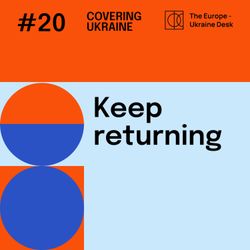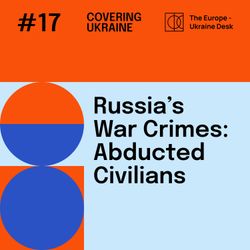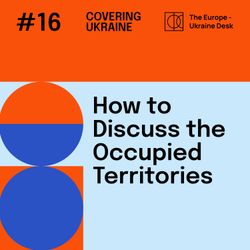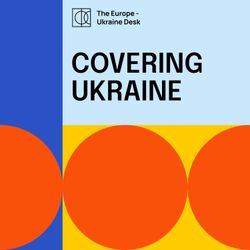Latest episode

9. Keep returning
23:46||Season 2, Ep. 9This last episode takes you to Kyiv in February 2025, during a third study visit organised by n-ost for the journalists from the EU. The participating media professionals reflect on how they see and experience Ukraine today, and how they witness the formation of a contemporary Ukrainian identity. Through site visits and conversations, we explore different facets of Ukrainian society. One recurring theme is trauma – both from the legacy of authoritarian rule and from the ongoing wounds of war. In the end, a clear insight emerges: the only way to begin to understand this country is to keep returning.Credits:Recorded by Yevheniia Sobolieva, a freelance producer for foreign media in Ukraine.Written by Daniel Bilyk and Yevheniia Sobolieva.Edited, Sound-designed and mixed by Daniel Bilyk.Covering Ukraine is a podcast produced by The Europe-Ukraine Desk, a project by n-ost and funded by the European Commission.Please write to eud@n-ost.org if you have any questions or feedback to share.
More episodes
View all episodes

8. French Perspective
25:28||Season 2, Ep. 8Similar to the perspectives on Ukraine in Germany discussed in the previous episode, French society largely discovered Ukraine only after February 24, 2022. At first, French media showed immense interest, frequently requesting commentary from French-speaking Ukrainian journalists and experts. Ukraine was at the center of attention, but as the war became a prolonged reality, pitching stories about Ukraine grew more challenging. What angles do journalists now explore to keep French audiences engaged with Ukraine? And how is Ukraine perceived today?This episode features a discussion between literary scholar and journalist Tetyana Ogarkova and Ukraine correspondent for Le Figaro, Mediapart, and L'Express, Clara Marchaud. The conversation took place at a Kyiv Media Hub event on November 1, 2024.Hosted and organised by Oksana Mamchenkova.Edited, sound-designed and mixed by Lyuba Gook.Covering Ukraine is a podcast produced by The Europe-Ukraine Desk, a project of n-ost, funded by the European Commission.For questions or feedback, please write to eud@n-ost.org.
7. German Perspective
29:30||Season 2, Ep. 7Over the past decade, Ukraine has gone from being largely unknown to most Germans to becoming a regular topic on TV, radio, and in print media. How did this transformation take place, and is it still ongoing? What factors have shaped the German media landscape and influenced newsrooms' approach to covering Ukraine?This episode presents a conversation with two media professionals – Anastasia Rodi, a reporter for taz, and Vassili Golod, head of the ARD Studio in Kyiv – which took place on October 16, 2024, as part of the Kyiv Media Hub events.Hosted and organised by Oksana Mamchenkova.Edited, sound-designed and mixed by Lyuba Gook.Covering Ukraine is a podcast produced by The Europe-Ukraine Desk, a project of n-ost, funded by the European Commission.For questions or feedback, please write to eud@n-ost.org.
6. Russia’s War Crimes: Abducted Civilians
33:32||Season 2, Ep. 6Right now, thousands of Ukrainians are missing or detained. Since 2014, Russia has been kidnapping and persecuting civilians in occupied Ukrainian territories. These abductions are part of a broader pattern of human rights violations, well-documented by international organisations, human rights groups, and Ukrainian authorities.In summer 2024, two journalists, Alona Savchuk from Ukraine and Robert Putzbach from Germany, collaborated to publish materials on this topic in the Frankfurter Allgemeine Zeitung.Hungarian journalist and EUD media network manager Kornelia Kiss speaks with Alona Savchuk and Robert Putzbach about their investigation and findings. The interview was recorded in October 2024. Credits:Hosted by Antonina Rybka. Written and recorded by Kornelia Kiss.Edited, sound-designed, and mixed by Lyuba Gook.Link to the article in the Frankfurter Allgemeine Zeitung.Covering Ukraine is a podcast produced by The Europe-Ukraine Desk, a project of n-ost, funded by the European Commission.For questions or feedback, please write to eud@n-ost.org.
5. 10 Years of War: How to Discuss the Occupied Territories
29:29||Season 2, Ep. 5This episode presents a discussion from the Kyiv Media Hub on the 16th of February, 2024. Alim Aliev, Deputy Director of the Ukrainian Institute, Kateryna Zarembo, a researcher and author on eastern Ukraine, and Anton Skyba, a journalist and photographer for foreign media, examined the challenges of reporting on Ukraine's occupied territories. They addressed issues such as dominant narratives, sustaining public interest, reporting beyond the war, limitations on journalists’ access, the protection of sources, illegal border crossings, and the informational value of these stories. The discussion was moderated by Angelina Kariakina, journalist, editor, and co-founder of the Public Interest Journalism Lab.Credits:Hosted and organised by Oksana Mamchenkova.Edited, sound-designed and mixed by Lyuba Gook.Proofread by Michael Bird.Covering Ukraine is a podcast produced by The Europe-Ukraine Desk, a project by n-ost and funded by the European Commission.Please write to eud@n-ost.org if you have any questions or feedback.
4. Overcoming Obstacles in Reporting
29:34||Season 2, Ep. 4This episode revisits a Kyiv Media Hub event held on the 14th of December 2023, where Ukrainian and EU journalists discussed the changing dynamics of their work. As the war continues, media coverage remains essential, yet public interest has been inconsistent. We explore how editorial priorities are shifting and what journalists can do to maintain the public’s focus on Ukraine.In this episode, you will hear:Davide Maria De Luca, an Italian journalist covering Ukraine for Domani, Il Post, and other media.Azad Safarov, a producer for the British TV channel Sky News.Rebecca Barth, a journalist from the German public broadcaster ARD.Moderation by Serhiy Stukanov, editor at Ukrainian Radio (Ukrainian Public Broadcaster).Credits:Hosted and organised by Oksana Mamchenkova.Edited, sound-designed and mixed by Lyuba Gook.Proofread by Michael Bird.Covering Ukraine is a podcast produced by The Europe-Ukraine Desk, a project by n-ost and funded by the European Commission.Please write to eud@n-ost.org if you have any questions or feedback.
3. “A Lump in My Throat”: Back to Everyday Life After a Visit to Kyiv
22:11||Season 2, Ep. 3A few months after our study visit to Kyiv, we reached out to the participants now back in safe EU capitals to find out how they have been processing their experiences. From Sofia to Madrid, each person felt a strong contrast between their time in Ukraine and everyday life at home. Feeling the urge to stay connected with Ukraine, some have started listening to Ukrainian music on Spotify, some read the online newspaper the Kyiv Independent in the morning, and others plan to return to work in Ukraine.This episode features insights in short WhatsApp messages from the 2024 cohort of Europe-Ukraine Desk fellows: Yavor Siderov (Bulgaria), Juan López Córcoles (Spain), Vincenzo Leone (Italy), Anna Banati (Hungary), Flora-Dora Csatari (Hungary), Alienor Carriere (France), and Elena Gorgis (Germany). Credits:Conceptualised and recorded by Sarah-Lou Lepers.Written, edited, sound-designed and mixed by Daniel Bilyk.Covering Ukraine is a podcast produced by The Europe-Ukraine Desk, a project by n-ost and funded by the European Commission.Please write to eud@n-ost.org if you have any questions or feedback.
